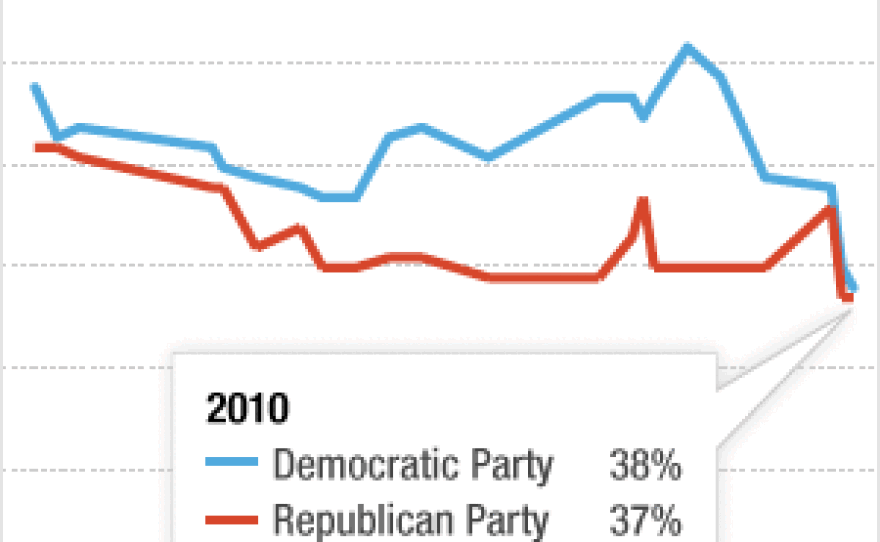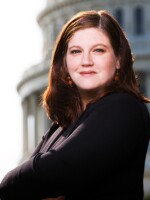The lofty space under the Rotunda in the Capitol Dome smells like history: wood oil and old stone. Clumps of tourists stand with their faces turned up toward inscriptions and classical frescoes adorning the inside of the dome. Among the visitors is Alice Carroll from Boston.
"It's awesome. It's unbelievable. It represents America as I like to think of it, when I was growing up, how I thought of it," Carroll says. "Makes me sad to see what's happening in Congress now."
The problem, Carroll says, is the hostility.
"I think healthy discourse is good," she says. "But I'm not sure the discourse we've been having through the last few months is healthy, and I'm concerned it's destructive."
The Pew Research Center's recent survey shows that 25 percent of Americans have a favorable view of Congress -- the lowest rating the legislative branch has gotten in the history of the survey.
Sandy and Yair Lotan, who brought their kids to the Capitol from Dallas, also say they're disappointed with members of Congress.
"Unfortunately, I think that a lot of their motivation is still on getting re-elected and having to sort of look out for their own legacies," Sandy Lotan says.
"[There is] a lot of bickering and partisanship, and if you're an average American, you're really worried about what's going to happen in five, 10, 15 years," Yair Lotan says.
Even under the Capitol Dome, Americans' view of Congress is decidedly dim.
'The Permanent Campaign'
Congressional scholar Norm Ornstein of the American Enterprise Institute says the low numbers are "no great surprise."
If there were one phrase that you'd want to use to describe the pathology of our time, it would be 'the permanent campaign.'
He says there is a reason why the level of trust in Congress is bumping the bottom.
"If there were one phrase that you'd want to use to describe the pathology of our time, it would be 'the permanent campaign,' " Ornstein says.
He says there used to be a season of campaigning, and then a season of governing. Now, it seems the two parties are as focused on gaining or maintaining the majority as they are on legislating. And that, Ornstein says, requires strict party discipline, constant fundraising and no sleeping with the enemy -- or what a normal person might call compromise.
"All of this cascades together into a public anger at politics-as-usual and a sense that everything in Washington is broken," he says.
Valuing Rational Solutions Over Hot Rhetoric
Someone who has seen this happen from inside and out is Rep. Bob Inglis (R-SC), who served in Congress in the 1990s when the GOP held the House Majority. Inglis left for the private sector for six years and then came back, mostly serving in the current Republican minority.

The problem, Inglis says, is that "the political process rewards people who shout from their partisan walls."
When the focus is on campaigning rather than legislating, it benefits candidates to say outrageous things.
For example, Inglis says, a pro-immigrant Democrat might raise money by promising legal residency to all illegal immigrants. But a Republican against immigration might raise money by saying "shoot to kill, and drop those bodies over the fence," Inglis says.
Neither of those will happen, Inglis says, "but it works great for politicians because you can raise money and enthusiasm that way. And you will never have a primary opponent."
Some way, somehow, people have to come around to valuing rational solutions over hot rhetoric, Inglis says.
A Polarized Electorate
But there's a conundrum buried in this and other recent surveys, says Scott Keeter of the Pew Research Center. Although a huge majority of respondents say they are fed up with partisanship -- 78 percent say lawmakers are unwilling to compromise -- Americans themselves are extremely divided, Keeter says.
"If a very polarized electorate is making nonnegotiable demands on their members as to how they're going to have to behave when making legislation, then it's going to be very difficult for the members if they want to get re-elected to have the latitude to compromise," he says.
In other words, you get what you vote for. Ornstein also sees the broader divisions in society.
"We're moving into communities with like-minded people," he says. "We're watching and listening to the media that reinforce the messages we already believe."
And, Ornstein says, people are supporting more strident political figures on both the left and the right -- figures who ultimately drive politics further apart.
The one thing that still unites Republicans, Democrats and independents, according to the survey, is their epic distrust of Congress, suggesting that Americans don't like this new polarized world. Perhaps that's the beginning of a new search for middle ground.
Copyright 2022 NPR. To see more, visit https://www.npr.org. 9(MDAzMjM2NDYzMDEyMzc1Njk5NjAxNzY3OQ001))







